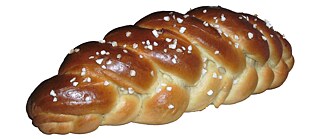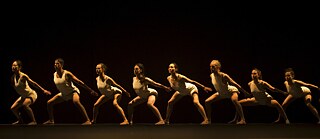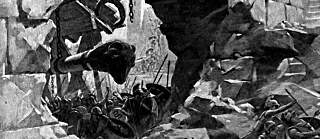The Lying Flat Movement
Resisting the Rat Race
In March of 2022, the term tǎng píng (躺平), “lying flat,” is trending on Chinese social media. Since the word became popular online and was selected as a 2021 buzzword of the year, it has become part of everyday internet language in China and often pops up in online discussions.
By now, lying flat has been adapted by the Chinese state media and is painted in a different light from how it initially emerged when it was used by young people to address their views on life.
What actually is lying flat? How has its meaning shifted, and what does it have to do with COVID-19, a “Buddhist-like mindset” and the problem of so-called “involution”? Here, we will explore these terms and zoom in on discussions surrounding China’s lying flat movement.
“Buddhist Youth” and Other Tribes
Every year, the Chinese language magazine Yǎo Wén Jiáo Zì (咬文嚼字) selects the most popular new words and expressions that often reveal trends among young people and also shed light on China’s rapidly changing society.One of the Chinese top buzzwords of 2018 was fó xì (佛系), a term from Japanese that started to be used in China to describe a “Buddha-like mindset.” In Japan, the term emerged in the media in 2014 to describe a specific type of male, “Buddhist men” (佛系男子), who are solely focused on their own hobbies and interests and self-indulgence without wasting any time on dating or love. The term also became popular among Chinese web users in late 2017 after a viral essay[1] from the WeChat account Xin Shixiang (新世相) used it to describe the lifestyle and mindset of many Chinese born in the 1990s (Sun 2017; Wu & Ren 2018, 15).
In the Chinese context, fó xì youth (佛系青年) mainly refers to people in their 20s or 30s who are pursuing a peaceful lifestyle in a fast-paced society. Despite being labeled as a “Buddhist mindset,” the term does not have a lot to do with Buddhist traditions. Instead, it refers to a laissez-faire attitude by which one does not take on any responsibility and just goes with the flow in order not to waste any time on trivial things.
According to an analysis by Hongjuan Wu and Ren Ying (2018), the term is not a “positive” one per se, but rather one of anxiety and negativity. Proponents of lying flat, Wu and Ying argue, are merely divulging in their own interests due to a lack of motivation and loss of willingness to interact with others and function in a highly competitive environment. The authors claim that China’s “Buddhist youth” are looking for ways to escape the pressures they face in an everyday life in which so much is expected of them, while they still struggle to pay for housing, medical care, and education — even if they work very hard.
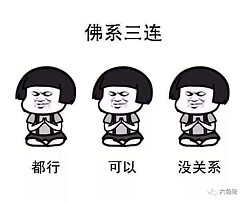 Buddhist youth adheres to three principles: everything’s alright, it’s all ok, it doesn’t matter.
| Image via QQ.com
Instead of joining the urban struggle and striving for a better everything (better housing, better jobs, better education), they just accept their reality as it is: it doesn’t matter if you win, if doesn’t matter if you lose, it doesn’t matter if you’re happy, it doesn’t matter if you’re sad. The 2018 popularity of the somewhat self-deprecating term “Buddhist youth” reflects a collective feeling of a certain helplessness among China’s post-’90s generation, urban dwellers who are trying to take back control by letting go.
Buddhist youth adheres to three principles: everything’s alright, it’s all ok, it doesn’t matter.
| Image via QQ.com
Instead of joining the urban struggle and striving for a better everything (better housing, better jobs, better education), they just accept their reality as it is: it doesn’t matter if you win, if doesn’t matter if you lose, it doesn’t matter if you’re happy, it doesn’t matter if you’re sad. The 2018 popularity of the somewhat self-deprecating term “Buddhist youth” reflects a collective feeling of a certain helplessness among China’s post-’90s generation, urban dwellers who are trying to take back control by letting go. The internet age has made these kinds of social sentiments and movements more visible than ever before, and some buzzwords spread so rapidly that they can turn into subcultures within a matter of weeks. Some specific terms and memes resonate with millions of people who identify with them, and they are also a way for people to connect to each other and create a sense of belonging. That sense of having some shared identity is underlined by the fact that these terms are often described as modern-day “tribes” or “clans” (族).
When the Chinese housing market experienced surging house prices over a decade ago, the term “Ant tribe” (蚁族) first saw the light — a neologism to describe a huge group of low-income, urban graduates who are hoping to find a job and settle down but end up living in poorer, crowded communities on the outskirts of the city, where the rent is cheap (Michels 2014, 31).
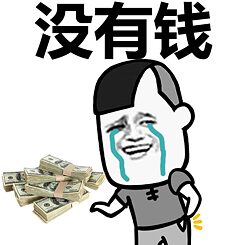 “Out of money” — the “Moonlight clan” referred to those young people would immediately spend all of their wages, leaving them completely broke before the end of the month.
| Image via Doutu
Similarly, the same period saw the emergence of the “moonlight tribe” (月光族), those younger workers who always spend their entire monthly salary on material things and having fun, enjoying the moment and not worrying about the future. You also had the “flea tribe” (跳蚤族) (job hoppers who are always looking for the next opportunity), the “latte tribe” (urban dwellers doing things at their own pace), and many more subcultures or social buzzwords.
“Out of money” — the “Moonlight clan” referred to those young people would immediately spend all of their wages, leaving them completely broke before the end of the month.
| Image via Doutu
Similarly, the same period saw the emergence of the “moonlight tribe” (月光族), those younger workers who always spend their entire monthly salary on material things and having fun, enjoying the moment and not worrying about the future. You also had the “flea tribe” (跳蚤族) (job hoppers who are always looking for the next opportunity), the “latte tribe” (urban dwellers doing things at their own pace), and many more subcultures or social buzzwords.There was also a major group of Chinese internet users who started labeling themselves as diǎosī (屌丝), basically meaning “losers,” using self-mockery and satire as a form of humoristic self-medication to deal with the hardships of everyday life and growing social inequality in contemporary China. The term diaosi became one of the most popular memes of 2012, signaling a growing disillusionment among low-income Chinese youths about being able to climb the social ladder (Szablewicz 2014, 259-260).
Involution and Lying Flat
Over the past decade, the Chinese internet has seen more and more memes and buzzwords relating to the rat race of modern-day China. Two of the most prominent are involution and lying flat, which were also both selected for the Yǎo Wén Jiáo Zì annual buzzword lists in 2020 and 2021, respectively.The concept of nèijuǎn (内卷), involution, describes the economic situation in which per capita wealth decreases as the population grows. The term originally comes from a 1963 work by the American anthropologist Clifford Geertz describing the dynamics of a fast-growing Indonesian population caught up in a cycle of intensive, high-labor wet-rice cultivation without making any real economic progress (Koetse 2021).
In the Chinese context, the term has come to be used to represent the competitive circumstances in academic and professional settings, where individuals are compelled to overwork because of the standard raised by their peers who appear to be even more hardworking. In a professional and educational environment, where people continuously work harder and longer, the increased effort becomes the new normal without becoming more rewarding.
One scene from the popular Chinese television drama A Love for Dilemma was trending on social media in 2021 because many netizens thought it perfectly captured the essence of involution. In the scene, two fathers discuss the Chinese education system, comparing it to a crowded movie theater, where everyone is trying to watch the show together until one person stands up to see more, forcing others behind them to also stand up to be able to see the screen. Then, people stand on their seats or even bring in ladders so that they can rise above the rest. Consequently, the others are also scrambling to get higher up, but in the end, nobody is comfortable. The entire audience is stressed out, and they all experience difficulties in watching the movie, while they could have just comfortably watched together if they would have remained in their seats (Koetse 2021).
One photo that has come to represent the concept of involution shows the “Tsinghua Volution King” (清华卷王), which is the nickname of a student who is cycling at the campus of Tsinghua, one of China’s top universities, while simultaneously working on his laptop — not wasting a single moment to stay ahead of his peers.
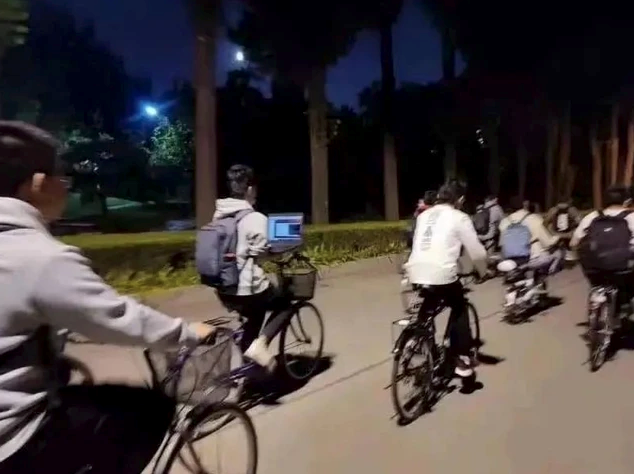 The Tsinghua Volution King
| Image via QQ.com
The Tsinghua Volution King
| Image via QQ.com
The generation that is most affected by a sense of being stuck in the rat race of socioeconomic stagnation is the post-’90s generation. In 2020, a record-high of 8.74 million university graduates entered the Chinese job market while many industries recruited fewer people than before in an employment market that was already competitive before the pandemic. These young adults end up in a pressure cooker, where they are stressed when they do not have that top job, afraid of missing the train, and where they are also stressed when they do have that top job, afraid of falling off the train (Koetse 2021).
Closely related to the concept of involution, offering an alternative to the rat race, is the social trend of lying flat (躺平), also known as “lying flatism” (躺平主义, 躺平学) or “the lying flat clan” (躺平族). Young people who believe in lying flat, are fed up with involution, do not buy into social expectations about marriage and children, and refuse to participate in the competitive struggle that starts as early as kindergarten — all about the upcoming exam, the best result, the top school, the promising job, the longest hours, the next promotion. By lying flat, Chinese young adults from middle and lower classes basically refuse to sweat over climbing higher up the social and economic ladder. They will only do the bare minimum and believe that upward social mobility has become an unattainable goal (Gong & Liu 2021, 2).
Although lying flat became a popular buzzword after an online article titled “Lying Flat is Justice”[2] went viral in China in 2021, it was already used by netizens long before that time. “I was chatting with my colleague after work,” one Weibo user wrote in November of 2018, “We were talking about how unfortunate it is that if you don’t work, you don’t have money, and that if you work, you still don’t have money. You might as well stop working and lie flat. No pain, no feelings, no involution.”
Although the term lying flat seems to indicate that the movement is all about passivity and weakness, it is actually more about social skepticism and taking matters into your own hands. One WeChat article by blogger Mao Talk (2021) compared the lying flat movement to the views held by the Greek philosopher Diogenes who believed society placed too much value on status, wealth, and material possessions and was determined to live a simple life. He did not work and never married.
The Chinese originator of lying flat, according to Mao Talk, is the philosopher Zhuangzi who advocated that the best form of being is without a “sense of self” (“no-self”) and “to go with the flow” instead of being driven by social intercourse and power structures. In an article published by the Guangming Daily in 2021, author Sun Xiaoting (孙小婷) also explained the lying flat movement in a similar light:
Although the lying flat movement resembles the Buddhist youth mentality and some other subcultures that have emerged over the past decade, there are clear differences. The Buddhist youth mentality seems to come from a more negative mindset of anxiety and frustration, with people trying to find some sense of stability by adopting an anything-goes attitude toward their life to protect themselves from disappointment and failure, while they are perhaps still pursuing a path laid out for them by others. Those who believe in lying flat, on the other hand, have readjusted their desires and goals for the future and decided to follow their own path.
Going Against the “China Dream”
Chinese official media tried to put an end to the diaosi trend after it first emerged by urging China’s young people to adopt a positive mindset, with the state media outlet People’s Daily publishing an article titled “The Belittling of Oneself, Can We Give it a Rest?” (Zhou 2017, 243). Ever since the lying flat movement became an online trend, the official Chinese media have also been condemning it.In May of 2021, one commentary published by the state media outlet Xinhua called the lying flat movement a “disgrace.” Although the article acknowledged the pressure faced by Chinese youth today, it stressed the necessity to uphold a confident and positive attitude. In 2022, lying flat is still presented by the Chinese media and officials as the road not to take.
In a recent interview with National People’s Congress representative Li Nannan (李楠楠) that was promoted on Weibo, the young delegate shared his take on involution and lying flat, urging Chinese youth to embrace competition and choose involution over lying flat, since the latter is supposedly only about giving up and spreading “a negative atmosphere.” Another state media news report focused on Chinese under the age of 27 (of the post-’95 and post-’00 generations), their positive outlook on their career possibilities, and their refusal to lie flat.
One reason why official channels label the lie flat movement as such a negative one is because it goes against the ideals of the Chinese dream. The idea of the “China Dream” has been ubiquitous in Chinese official media since Xi Jinping became president in 2013. The concept refers to a form of “national rejuvenation” and a revival of the Chinese nation. At the National People’s Congress in March of 2013, Xi stated that in order to achieve the Chinese dream “...we must spread the Chinese spirit, which combines the spirit of the nation with patriotism as the core and the spirit of the time with reform and innovation as the core.” He also stressed:
In the context of China’s road to rejuvenation, Chinese youth and young adults are seen as the “builders of socialism” who are supposed to contribute to the realization of the Chinese dream by having clear goals, strong ideals, and by working hard and actively to start businesses and raise families. Youth subcultures such as the diaosi, Buddhist youth, or lying flat are seen as having a negative impact on Chinese society since they allegedly do not contribute to a Chinese common ideal of socialism and reject the kind of lifestyle that is propagated by the Party (Wu & Ren 2018, 17).
![Contemporary youth “Contemporary youth [should] never choose to ‘lie flat’” online poster by Communist Youth League](/resources/files/jpg1149/bild-6-contemporary-youth-formatkey-jpg-w245.jpg) “Contemporary youth [should] never choose to ‘lie flat’” online poster by Communist Youth League
| Online poster by Communist Youth League
Lately, the term lying flat has also been used by official media in the context of China’s approach to fighting COVID-19 following a surge in local outbreaks. While many other countries around the world are letting go of COVID-19 measures, China is still adhering to its strict “zero COVID” strategy, with millions of people facing yet another lockdown. It has triggered online discussions on whether the aggressive measures taken to prevent further spread of the virus are really the way forward for China’s COVID approach. But after the renowned Chinese doctor Zhang Wenhong stated that China cannot lie flat at this point of the COVID-19 outbreak due to the potential death toll it might cause, a related hashtag went trending on the social media platform Weibo (“Zhang Wenhong Does Not Agree with Lying Flat”).
“Contemporary youth [should] never choose to ‘lie flat’” online poster by Communist Youth League
| Online poster by Communist Youth League
Lately, the term lying flat has also been used by official media in the context of China’s approach to fighting COVID-19 following a surge in local outbreaks. While many other countries around the world are letting go of COVID-19 measures, China is still adhering to its strict “zero COVID” strategy, with millions of people facing yet another lockdown. It has triggered online discussions on whether the aggressive measures taken to prevent further spread of the virus are really the way forward for China’s COVID approach. But after the renowned Chinese doctor Zhang Wenhong stated that China cannot lie flat at this point of the COVID-19 outbreak due to the potential death toll it might cause, a related hashtag went trending on the social media platform Weibo (“Zhang Wenhong Does Not Agree with Lying Flat”).The term was previously used in a similar way by the Communist Youth League, which published a post on social media titled “Modern-day Youth Should Never Choose to Lie Flat.” In their post, the League honored China’s young frontline health workers, soldiers, scientists, and those defending the motherland with their lives, writing:
By construing a clear distinction between those fighting for the nation and those lying flat, Chinese media suggest that lying flat is an unpatriotic act, a type of behavior that shows a lack of devotion to one’s country.
While those lying flat are criticized, those “going against the tide” are praised; nìxíngzhě (逆行者) is another buzzword from 2020 often used by the state media to describe frontline workers and others as the “people going backward,” referring to those who dare to go back and face problems when everyone else is turning away.
The state media message that lying flat is counterproductive seems to resonate with many online commenters. Although the movement was previously described as an “act of resistance” by The Washington Post and other media, there now seems to be more aversion to this form of resistance.
Nevertheless, there is still a huge group of netizens supporting the lying flat movement for the ideas it represents. One Weibo user says that the lying flat movement should be viewed as an online “collective emotional catharsis” that helps people pull through their everyday life. Another post by one popular blogger that recently gained some traction online said:
One commenter responded: “We are living in a socialist country, but judging by the way in which workers are treated it might as well be a capitalist society.”
Ironically, not too long after tǎng píng, or lying flat, became a buzzword, news came out that Chinese tech giant Alibaba had applied for trademark registration of tǎng píng to create an e-commerce app by that very same name.
Many people mocked the move. One person wrote: “You are shameless.” Another comment said: “The implied meaning behind lying flat is about wanting less and reducing consumerism, but you capitalists really seize every opportunity, you are even willing to squeeze the last bit of values out of young people.”
Despite the changing meaning and different views on the lying flat trend in China’s online environment, one Chinese news article on the issue recently found common ground with adherents of the movement: “We need to find a balance in between involution and lying flat, so that life can be full of color while also leaving blank spaces because you can only find your best life when you can find the balance between tension and relaxation.”
-----------------------------------
[1] Title: “The First Batch of the Post-’90s Generation Has Taken the Cloth” (“第一批 90 后已经出家了”).
[2] “躺平即是正义”(“Lying Flat is Justice”) was written by a blogger named “Kind-hearted Traveler” (好心的旅行家) on April 17, 2021. In the article, they described how they lead a minimalist lifestyle and explained the lying flat subculture as an alternative approach to life.
[3] “Salted fish mentality,” “Ge You-esque Slouching,” and “funeral culture” are all buzzwords and online trends used by netizens since 2016 to express a sense of passivity and laziness in response to the ruthless job market and pressure to marry (also see Colville 2021).



